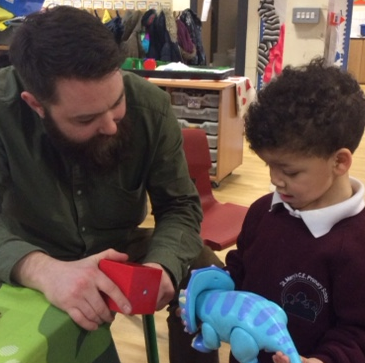Photograph posed by model

James is a Child Centred Play Therapist who works with children and their families drawing on Systemic and Attachment theories. With over 8 Years’ experience of working with children in Nurture Groups, Friendship groups and one-to-one support, James has developed an in depth knowledge of children’s emotional wellbeing and behaviour.
Since completing the BAPT accredited Masters Degree, James has worked at a number of schools in the Central Manchester area. He has worked with a broad range of children with complex needs including grief, loss and trauma as well as children displaying a range of challenging behaviours in school.
James is based at St. Mary’s CofE primary school but is available to work peripatetically.
What is Play Therapy?
Play Therapy is an effective therapy that helps children modify their behaviours, clarify their self-concept and build healthy relationships. In Play Therapy, children enter into a dynamic relationship with the therapist that enables them to express, explore and make sense of their difficult and painful life experiences. Play Therapy helps children find healthier ways of communicating, develop fulfilling relationships, increase resiliency and facilitate emotional literacy.
Children use play as a form of communication, play is their natural form of expression. Often children referred to Play Therapy have limited words to describe their thoughts, feelings and perceptions of their internal and external world.
Play Therapy is an effective treatment for a variety of emotional and/or behavioural difficulties that children may present after experiencing trauma, abuse, neglect or loss etc.
(British Association of Play Therapists 2014)
Why Play Therapy in Schools?
An estimated 1 in 10 children in the UK have a mental health problem in any given year (Office of National Statistics 2004). As staff in schools work closely with these children they can often be the first to spot any difficulties a child may be experiencing. Children experiencing emotional and behavioural difficulties often struggle to engage in the classroom and are often unable to fully access the curriculum.
Play Therapy can help children overcome difficult and traumatic life experiences but it can also boost children’s ability to emotionally self-regulate, help them develop better relationships with teachers and other staff and allow them to more fully access the learning opportunities available.
- Helps children to build healthier relationships with teaching staff and peers
- Reduces emotional, behavioural and social obstacles to learning
- Improves children’s problem solving and coping skills
- Enhances communication skills as well as emotional literacy
- Develops children’s confidence and concentration
- Supports and advises teaching staff
Accommodating Play Therapy in your school
To accommodate Play Therapy in your school you will need:
- A private room , free from interruptions, that is accessible at the same time every week
- Techers and other relevant staff to be available to meet with the Play Therapist regularly to discuss referrals and share other relevant information.
- Regular communication between the Play Therapist and SENCo and Safeguarding Lead Professional.
- An understanding of Play Therapy and the boundaries necessary for effective provision (which your Play Therapist will be able to help with)
Day rates and individual client rates are available.
For further information or an initial discussion, please contact:
E: jamescadieuxplaytherapy@st-marys-mossside.manchester.sch.uk
Tel: 0161 226 1773 (St Mary’s Primary School)

